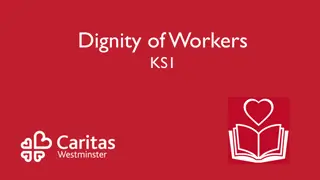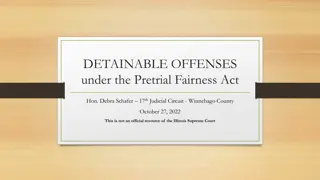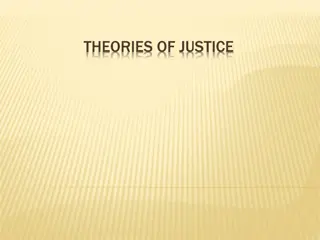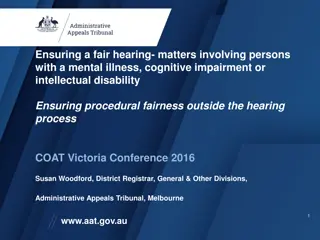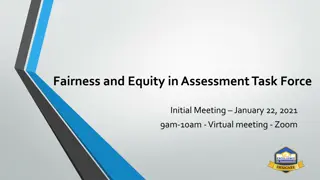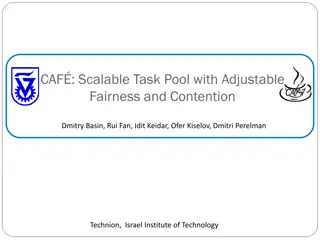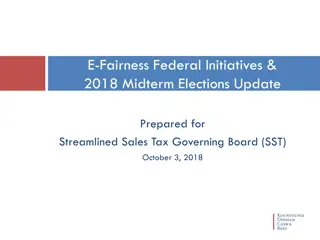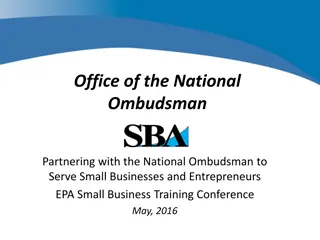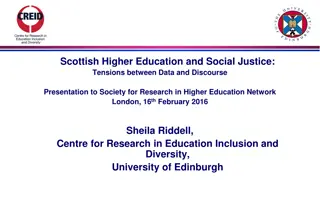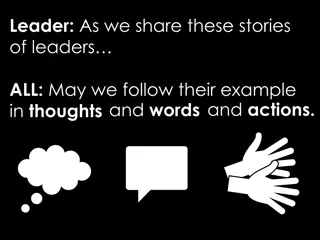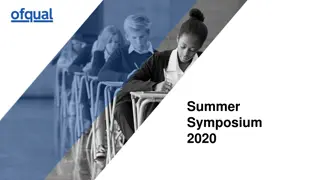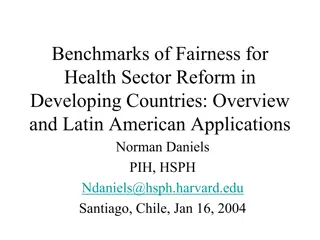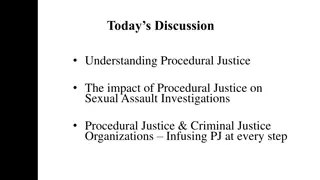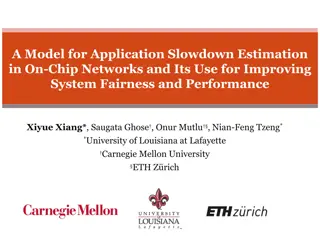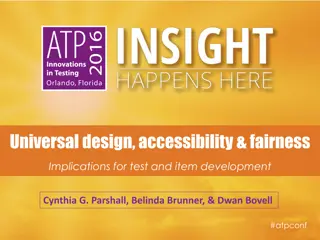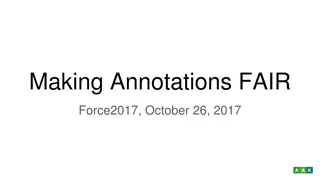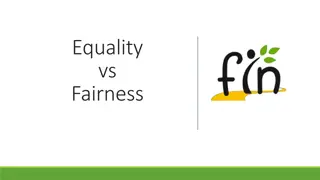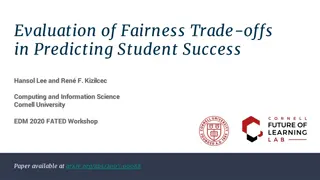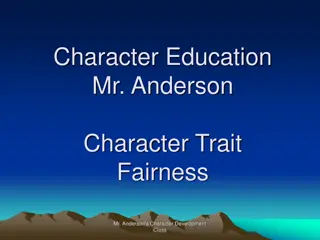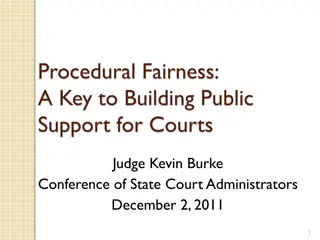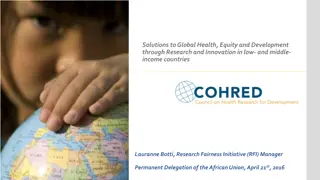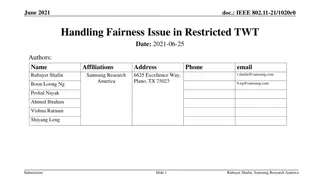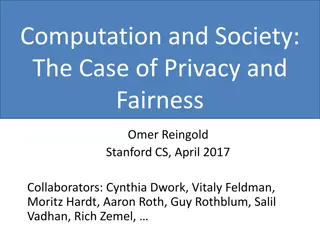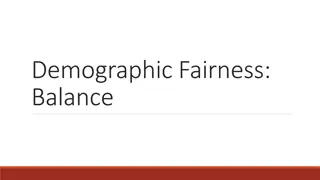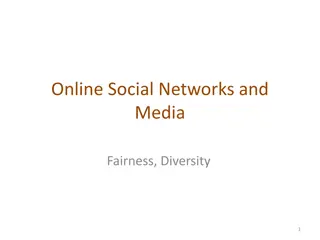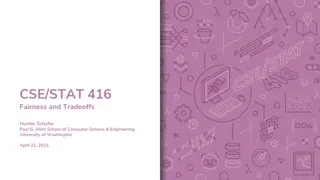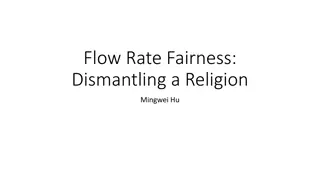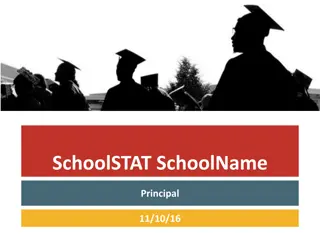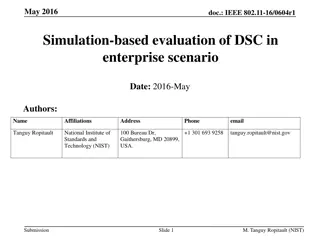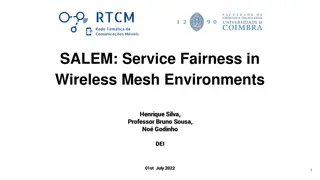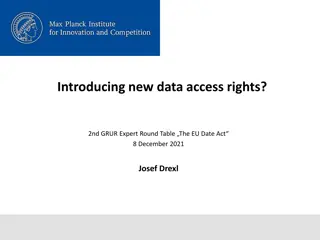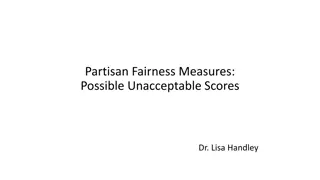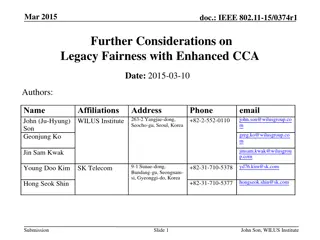Residency Requirements in Awarding Academic Certificates: A Critical Examination
Exploring the significance of residency requirements in the context of academic awards at MJC, this analysis delves into the current practices, reflections on fairness and responsibility, as well as comparisons with other institutions like Delta College. The discussion questions the implications of
2 views • 23 slides
Academic Promotions Round 2024
This briefing session provides an overview of the academic promotions process for the 2024 round at Queen Mary University, emphasizing the framework for career development, evidence-based application, quality over quantity, workload allocation, fairness, and consistency. It highlights the key aspect
9 views • 24 slides
Understanding Dignity of Workers in the Workplace
Exploring the concept of treating workers with respect and fairness, this educational material introduces children to the importance of breaks, fairness in pay, and overall dignity in working environments. Through engaging images and thought-provoking questions, it encourages reflection on what fair
1 views • 14 slides
Guide to Detainable Offenses under the Pretrial Fairness Act
The Pretrial Fairness Act allows for pretrial release for all persons charged with offenses before conviction, except in cases of detainable offenses where dangerousness or willful flight is involved. The state must prove by clear and convincing evidence that the defendant poses a real and present t
1 views • 26 slides
Theories of Justice and Rawls' Principles Explained
Explore various theories of justice including comprehensive, principle-based, and contextual approaches, along with types of justice such as procedural and distributive. Delve into Rawls' social contract and principles of justice focusing on fairness and equality. Discover how Rawls envisions a just
2 views • 22 slides
Exploring Fairness and Prejudice Through the FuF Game
Delve into themes of fairness, prejudice, and immigration through a unique game experience where players must navigate unclear rules and unfair treatment. Reflect on the parallels between the game and real-life situations faced by immigrants and newcomers to Canada, highlighting the importance of fa
0 views • 11 slides
Ensuring Fair Hearing in Legal Proceedings for Individuals with Disabilities
Susan Woodford discusses the importance of procedural fairness in legal proceedings involving individuals with mental illness, cognitive impairment, or intellectual disability. She emphasizes the need for flexibility in adopting fair procedures tailored to each case, including providing information
0 views • 7 slides
Fairness and Equity in Assessment Task Force Meeting Overview
The Fairness and Equity in Assessment Task Force is committed to establishing guidelines to ensure fairness in assessment processes at the University of Florida. The task force members are tasked with developing models and guidelines for faculty and staff to promote equitable assessment practices. R
1 views • 29 slides
Key Principles of Insurance Explained with Visuals
Understanding the principles of insurance is crucial for both insurance seekers and companies. The principles include Utmost Good Faith, Insurable Interest, Indemnity, Contribution, and Subrogation. These principles ensure transparency, fairness, and protection for policyholders. Visual representati
0 views • 6 slides
Scalable Task Pool with Adjustable Fairness
Explore CAF, a scalable task pool with adjustable fairness and contention, offering a solution to the inherent scalability problems of FIFO queues. The system allows for control over the level of relaxation, providing more fairness or less contention as needed. With a focus on bounded non-FIFO pools
5 views • 26 slides
Update on E-Fairness Federal Initiatives & 2018 Midterm Elections
The Supreme Court decision in South Dakota v. Wayfair has paved the way for states to require out-of-state sellers to collect and remit sales tax. Various federal legislative bills have been introduced in the 115th Congress regarding e-fairness. The Marketplace Fairness Act, S.976, aimed to establis
0 views • 36 slides
Serving Small Businesses and Entrepreneurs: Office of the National Ombudsman
The Office of the National Ombudsman, created under the Small Business Regulatory Enforcement Fairness Act of 1996, acts as a mediator between small businesses and federal agencies, addressing concerns about regulatory enforcement. Encouraging regulators to prioritize compliance assistance over pena
2 views • 16 slides
Exploring Global Food Chains for 7-11 Year Olds
Embark on an educational journey delving into the complexities of global food supply chains through engaging slideshows and thought-provoking discussions. Understand the stages food products undergo from cultivation to consumption, ponder over fairness in supply chains, and even simulate the movemen
0 views • 15 slides
Understanding Social Justice in Scottish Higher Education
Explore the complexities of social justice in Scottish higher education through the lens of data and discourse. Delve into questions about fairness, student demographics, financial resources, and the impact of free undergraduate tuition on creating a more equitable system. Learn about research metho
0 views • 29 slides
Embracing Fairness: Lessons from Leaders and Wilma Rudolph
Explore the inspirational stories of leaders and Wilma Rudolph, reflecting on fairness, equality, and compassion. Reflect on what we can learn, address unfairness in our world, and create a fair environment at school. End with a call to action for treating each other fairly every day by establishing
0 views • 13 slides
Reflecting on Fair Distribution of God's Gifts
The Gospel reading of Matthew 20:1-16 tells the parable of workers in a vineyard, highlighting God's generosity and fairness in rewarding all workers equally, regardless of when they started working. It emphasizes the importance of sharing our gifts and blessings with others, ensuring everyone has e
0 views • 17 slides
Insights from Summer Symposium 2020: Assessments, Fairness, and Results
The Summer Symposium 2020 provided valuable insights on various topics, including assessments, fairness in grading, and looking ahead to results in the education sector. Key discussions included the process of awarding grades, ensuring fairness for all students, and considerations for interpreting a
0 views • 48 slides
Benchmarks of Fairness in Health Sector Reform: Overview and Applications
Overview of benchmarks for fairness in health sector reform, tracing historical development, adapted benchmarks, connections to social justice, structure of benchmarks, and comparison with the WHO framework. Covers key aspects such as intersectoral public health, financial barriers, equity in access
0 views • 41 slides
Understanding Procedural Justice and Its Impact on Criminal Justice Organizations
Procedural justice emphasizes fairness, respect, and transparency in decision-making processes. This approach can lead to positive organizational changes, improved community relationships, and increased trust and legitimacy. The four pillars of procedural justice include fairness in rule application
0 views • 12 slides
A Model for Application Slowdown Estimation in On-Chip Networks
Problem of inter-application interference in on-chip networks in multicore processors due to NoC contention causes unfair slowdowns. The goal is to estimate NoC-level slowdowns in runtime and improve system fairness and performance. The approach includes NoC Application Slowdown Model (NAS) and Fair
0 views • 25 slides
Implications of Universal Design, Accessibility, and Fairness in Test Development
This content discusses the implications of universal design, accessibility, and fairness in test and item development. It covers topics such as common test accommodations, types of assistive technology, innovative item types, accessibility in item interface designs, QTI coding for screen reader soft
0 views • 52 slides
The FAIR Principles for Data Management and Stewardship
Embrace the FAIR principles - Findable, Accessible, Interoperable, Re-usable - for effective scientific data management and stewardship. Learn how annotations enhance data FAIRness and the key attributes of each principle. Dive into the high-level guiding principles that ensure data is globally uniq
0 views • 25 slides
Exploring Equality vs. Fairness through Visual Representations
This project prompts the creation of visual representations to differentiate between equality and fairness. Various examples and directions are provided in the form of images for inspiration, encouraging participants to draw, create posters, or write poems to illustrate the concepts.
0 views • 9 slides
Evaluation of Fairness Trade-offs in Predicting Student Success
This study delves into fairness concerns in predicting student success, examining trade-offs between different measures of fairness in course success prediction models. It explores statistical fairness measures like demographic parity, equality of opportunity, and positive predictive parity. Through
0 views • 11 slides
Character Education: Understanding Fairness and Equity in Mr. Anderson's Class
Explore the core character traits of fairness and equity taught in Mr. Anderson's Character Development Class. Fairness is exemplified through impartial treatment, sharing, and abiding by rules. Equity involves correcting mistakes, not taking advantage of others, and ensuring fair shares. Discover k
0 views • 27 slides
Understanding Public Perceptions of Courts and Judges
Exploring public opinions on procedural fairness in courts, this content discusses the influence of judges' political views, aspirations for higher courts on their impartiality, and the divided nation on interpreting the Constitution. It also highlights the complexities of public knowledge about the
0 views • 24 slides
Promoting Global Health Equity Through Research and Innovation
This initiative led by the Council on Health Research for Development (COHRED) focuses on accelerating the development of research and innovation systems in low- and middle-income countries to improve health equity and sustainable development. The Research Fairness Initiative (RFI) aims to address u
0 views • 13 slides
Handling Fairness Issue in Restricted TWT Operation
Proposal addressing fairness vs. channel utilization tradeoff in restricted Target Wake Time (TWT) operation for IEEE 802.11 networks. Solution suggested for underutilization of TWT schedules due to early completion of latency-sensitive transmissions, mitigating fairness concerns while optimizing ch
0 views • 14 slides
The Intersection of Computation and Society: Privacy and Fairness Challenges
Exploring the impact of computational algorithms on society, particularly in terms of privacy, fairness, and policy considerations. Collaboration between computer science and other disciplines is highlighted, along with the importance of addressing issues such as data privacy, AI ethics, and digital
0 views • 26 slides
Achieving Demographic Fairness in Clustering: Balancing Impact and Equality
This content discusses the importance of demographic fairness and balance in clustering algorithms, drawing inspiration from legal cases like Griggs vs. Duke Power Co. The focus is on mitigating disparate impact and ensuring proportional representation of protected groups in clustering processes. Th
0 views • 36 slides
Ensuring Fairness and Diversity in Online Social Networks and Media
Embracing fairness and diversity in online social networks and media is imperative to combat discrimination and biases. From addressing data correctness and completeness to understanding processing algorithms and disparate treatment, the quest for fairness through blindness and individual fairness i
0 views • 39 slides
Understanding Fairness and Tradeoffs in Machine Learning
Explore the concept of fairness in machine learning models and how biases can impact decision-making processes. Delve into various sources of bias and frameworks for understanding unintended consequences. Using college admissions as an example, discover different approaches to achieving group fairne
0 views • 32 slides
Challenges of Flow Rate Fairness in Network Resource Allocation
Addressing the concept of flow rate fairness in network resource allocation, this content explores its limitations and challenges. Despite being a goal in protocols like TCP, the practicality and enforceability of flow rate fairness are questioned. It highlights the inadequacy of flow rate as a meas
0 views • 15 slides
Equity, Access, Opportunity, and Fairness in Educational Initiatives
This content presents a series of data points, images, and action-oriented goals related to promoting equity, access, opportunity, and fairness in education. It emphasizes the importance of monitoring progress and involving stakeholders in achieving these goals.
0 views • 6 slides
Evaluation of Dynamic Sensitivity Control in Enterprise Scenario
Simulation-based evaluation conducted by Tanguy Ropitault from NIST on Dynamic Sensitivity Control (DSC) in an enterprise scenario using IEEE 802.11 standards. The study investigates the impact of DSC on per-user throughput and fairness in dense scenarios. Recommendations on DSC parameters are provi
0 views • 16 slides
SALEM: Service Fairness in Wireless Mesh Environments
SALEM project focuses on managing resources intelligently in Wireless Mesh Networks to ensure fairness among services with heterogeneous technologies. Implementing a fairness model incorporating delay, reliability, and energy objectives, SALEM is tested in smart city scenarios. Through MILP optimiza
0 views • 11 slides
Enhancing TCP Fairness Using P4-Programmable Data Planes
This study presents a solution to improve TCP fairness in non-programmable networks by utilizing P4-programmable data planes. It addresses unfair bandwidth distribution issues in TCP traffic and proposes a system that leverages P4 switches for passive traffic monitoring and RTT computation.
0 views • 24 slides
EU Data Access Rights: Maximizing Innovation and Fairness in Data Economy
The 2nd GRUR Expert Round Table discussed the importance of introducing new data access rights in the EU, aiming to create a Single Market for data while ensuring fairness and clarity in data usage. The Inception Impact Assessment highlighted the need for increased data access to benefit various act
0 views • 13 slides
Analysis of Partisan Fairness Measures and Efficiency Gaps in Redistricting Plans
This analysis delves into partisan fairness measures and efficiency gaps in various redistricting plans challenged in Ohio, Pennsylvania, Wisconsin, and Michigan. Dr. Lisa Handley and other experts discuss thresholds for unconstitutional plans and the impact of lopsided margins. The Efficiency Gap,
0 views • 7 slides
Legacy Fairness Enhancement in IEEE 802.11 Networks: Further Considerations
Investigating legacy fairness issues in IEEE 802.11 networks, this document explores methods to address throughput starvation of legacy stations due to enhanced Channel Clear Assessment (CCA) in High Efficiency (HE) stations. Two fairness methods, Legacy Frame Protection and PPDU Size Reduction, are
0 views • 9 slides


